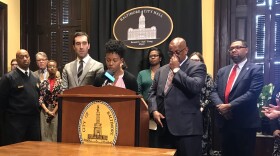Gov. Larry Hogan has announced several drastic actions aimed at mitigating what experts say is the inevitable spread of the novel Coronavirus in Maryland. Among these, the state is closing public schools for two weeks, activating the National Guard, and closing the Port of Baltimore to cruise ships.
The measures were prompted by the news that Maryland has its first confirmed case of community-transmitted COVID-19, the disease caused by the new Coronavirus. The infected person, a Prince George’s County resident, has no known exposure to the virus through travel or another infected person.
https://youtu.be/zgvsiCjo_-M">At a press conference Thursday, Hogan said the development signifies a new phase of the public health crisis.
“We should expect the number of cases to dramatically and rapidly rise,” said Hogan while flanked by several public officials and health experts. “Our primary focus is now turning from containment to aggressively working to mitigate and limit the spread of the virus.”
Hogan announced a series of extraordinary, and to some extent unprecedented, actions.
He has activated the National Guard, so that they are ready for whatever comes next.
Public schools will be closed for two weeks beginning Monday while buildings and buses are cleaned and disinfected.
Hogan signed an executive order banning “any social, community, religious, recreational, or sports gatherings or events of more than 250 people in close proximity at all locations and venues across the state.”
Senior centers are closed until the state of emergency is lifted.
The Port of Baltimore is closed to cruise ships, except for two ships that will be allowed to return in the coming days.
Driver’s licenses and other state licenses and permits due to expire will be extended until 30 days after the state of emergency ends.
Visitors to hospitals will be restricted, while visits at state prisons will be suspended. Earlier in the week, Hogan issued guidance to nursing homes that also restrictions on visitors.
Public access to state buildings is restricted, and non-essential state employees who can will work remotely.
“The actions that I have announced here today will be disruptive to your everyday lives,” Hogan said. “And they may sound extreme, and they may sound frightening, but they could be the difference in saving lives and helping keep people safe.”
But he also said daily life shouldn’t come to a complete stop. Businesses should stay open, especially gas stations, grocery stores and restaurants.
At a meeting of the Board of Revenue Estimates earlier in the day, Comptroller Peter Franchot warned that the impact the novel Coronavirus will have on the state’s economy is an almost-complete unknown.
“Obviously, we don't know how long this pandemic will last — how much worse it will get — so at this point, it's not possible to assess the full economic impact on our state,” he said. “What we do know is that it's going to be significant, if not historic.”
The General Assembly, meanwhile, is going to continue its session for now. However, members plan to work through weekends and pass priority bills as quickly as possible to prepare for the possibility that they have to adjourn before the scheduled end on April 6.
“In order to fulfill our Constitutional duties and protect the health and safety of all Marylanders, we need to be sure that the Governor has the resources necessary to maintain public health during this extraordinary time,” House Speaker Adrienne Jones and Senate President Bill Ferguson wrote in a joint statement. “The good news is that this is not permanent. The more proactive measures we take now, the better Maryland will fare over the weeks to come.”
State courts are suspending all jury trials beginning Monday through April 3.
In Baltimore City, Sheriff John Anderson and District Administrative Judge Barbara Waxman have halted evictions while schools are closed, Mayor Jack Young announced Thursday.
Officials are also grappling with the upcoming primary election on April 28. Hogan promised more details in the coming days on how voters will be able to cast their ballots.







